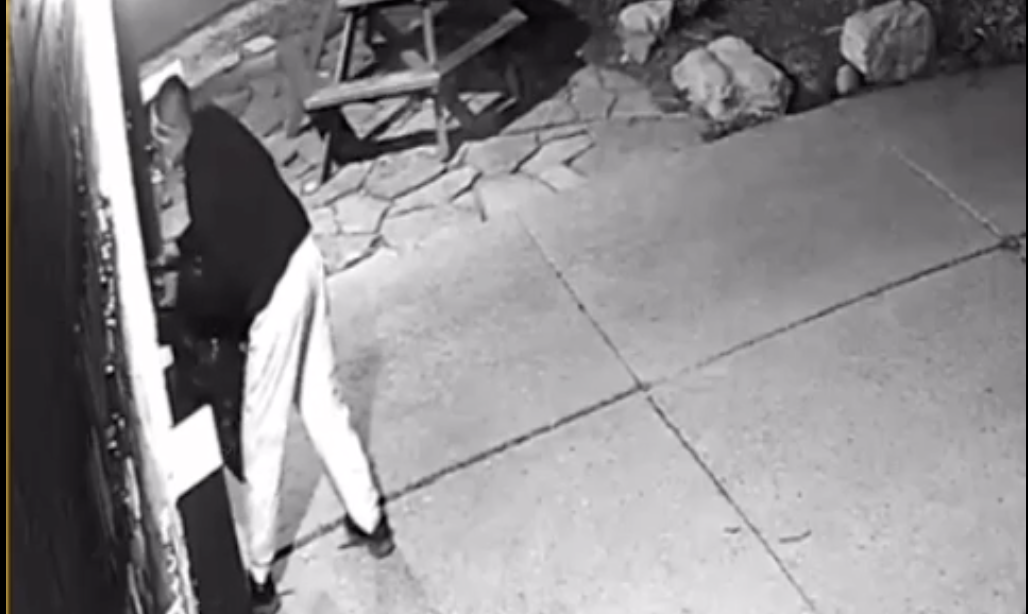UPDATE (8/9/22): Toronto city councillor James Pasternak confirmed a suspect has been arrested and charged—read the initial Aug. 3 story on the break-ins below.
Rabbi Shmuel Neft thought the police would be more concerned by multiple attempted break-ins of a space that operates as both a shul and Jewish community centre.
The director and spiritual leader of the Jewish Russian Community Centre (JRCC) branch on Rockford Road in Toronto was first alerted to some damage on the building’s front façade on Tuesday, July 26. Two days later, Rabbi Neft noticed the damage had severely worsened, so he checked the security tape and found footage of a man attempting to break into the building with a large chunk of broken-off pavement.
Although the break-in attempt was repeated, Rabbi Neft said he had no reason to believe it was motivated by antisemitism. The most likely explanation he thought was that the perpetrator had identified the centre as likely containing money and valuables.
After looking at the video, Rabbi Neft attempted to report the incident to the police. He first called 32 Division, the police precinct that serves the JRCC’s area, near Bathurst Street and Steeles Avenue.
And after waiting on hold for two hours, he decided to go into the office in person around 10 p.m. Once there, however, the officers at the location told him they could not accept his report, as it could only be delivered over the phone.
“So I said, ‘I’m going to wait, what, three hours, four hours… I’m going to have to sit and wait until late into the night, until God knows when?… The system means that I go to bed tonight worrying about the fact that the repeat offender is going to come back a third time, learn from his mistakes and finally get into the building, and only then when he gets into the building and we find out about it and we contact you, then you’re going to do something about it?” Rabbi Neft asked the officer.
In response, the officer told him the repeated attempted break-ins only amounted to a mischief case, since the perpetrator had not succeeded in his attempts, and that he should call the hotline, Rabbi Neft said. At that point he returned to the JRCC and removed the Torah scrolls from the ark, hoping everything would be okay the next morning.
When the next morning rolled around, Rabbi Neft, who moved to Toronto from New York over three years ago, said his “no-nonsense American instinct kicked in.”
He and a number of community members spread the word about the incident and his difficulty reporting it to the police. A video of someone trying to break into the synagogue went viral on Jewish Toronto social media. Soon after, calls were coming into the JRCC from concerned community members and advocacy organizations, and going out to the police to complain about the dismissive response.
Toronto City Councillor James Pasternak, who represents the riding, said he was disappointed by how difficult it was for Rabbi Neft to make a report.
“They can’t always send a cruiser within minutes… But once this incident was brought to their attention, it was very important that all the details of the incident were documented and that the police started working on the case right away,” he said.
“As antisemitism escalates, this is a disturbing escalation where an institution was threatened. And if we can’t be safe inside our places of worship or inside our Jewish schools or Jewish institutions, we need immediate police response…
“I would say that the response to this was inadequate and that when I reconvene with the Chief (of Toronto Police Services), this incident is going to be at the top of the agenda.”
Once the police began getting a tide of complaints from concerned community members and advocacy organizations, Rabbi Neft got a call from the chief of 32 Division saying they would be sending officers out to JRCC to make a report.
“So basically, in order to get the minimal amount of attention needed, we had to make crazy noise” Rabbi Neft said, adding that he was initially told it could take five days or even two weeks for officers to come to the scene.
Before this incident he understood that the police were understaffed, but not to this degree. One of the officers he interacted with told him the Toronto Police Services were operating with 4,500 members, which is 1,000 short of their optimal number. And the already overtaxed police were stretched especially thin when Rabbi Neft tried to report the attempted break-ins due to three music festivals going on in the city at the same time, he said.
“As I’m learning more and more about the background it makes me more and more outraged and gives me more and more of a feeling of responsibility for being the ones that’s going to try to do something in order to stop it. It’s not just about what happens here (at the JRCC), it’s in general about life in the city now.
“I plan on serving this community with everything I have, and I find it crazy in this city we have to be so scared about things like this happening. Both antisemitic attacks, which are not so uncommon anymore, and everyday crime.”
In spite of the frustration in initially trying to report the crime, Rabbi Neft made sure to say that he was very grateful that the officers he spoke to were working on the case and taking it seriously.
For their part, the Toronto Police Service said the delay in accepting the report was likely due to their triage system.
“When the community calls 911 or the non-emergency number, the calls are prioritized for service. Priority one calls for service are emergency situations that require an immediate assistance such as danger to life. They also include incidents that require immediate police attendance where there is a potential for imminent danger or injury,” Constable Cindy Chung, media relations officer for Toronto police, said in an emailed statement.
“Non-emergency situations will be those where the potential for imminent danger and or injury is not a factor. Some of the reports can be taken over the phone and/or online and an investigator will follow up. In regards the length of time it took to file the report for the attempt Break and Enter it may have been a busier evening with higher priority calls.”







